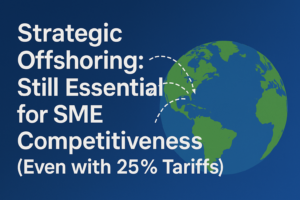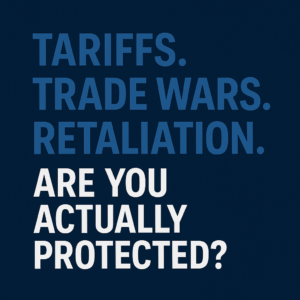
Executive Summary
The manufacturing industry, particularly in the concrete production equipment sector, faces increasing pressure to reduce costs, improve product quality, and remain competitive globally. This white paper explores how engaging a Design for Manufacturing (DFM) specialty engineering firm and leveraging fully managed offshore manufacturing in non-tariff countries like India and Vietnam can significantly enhance financial, technological, and operational outcomes. By refining designs for manufacturing, material science, logistics, and inspection (DFM/DFL/DFI), manufacturers can reduce costs, boost product reliability, and ensure scalable production without compromising quality.
Introduction
The concrete production equipment industry—encompassing compressors, air separation units, natural gas treatment systems, molds, tools, and accessories—faces challenges such as fluctuating material costs, stringent quality demands, and global competition. Companies must innovate not only in product design but also in production strategy to maintain profitability. This paper presents a strong business case for partnering with a DFM-focused engineering company and offshoring manufacturing to regions like India and Vietnam, highlighting tangible benefits in cost, quality, and efficiency.
Section 1: The Strategic Role of DFM, DFL, and DFI in Reducing Costs and Improving Quality
Understanding DFM, DFL, and DFI
Design for Manufacturing (DFM) focuses on optimizing product design for ease of manufacturing, leading to reduced production costs and fewer defects. Design for Logistics (DFL) ensures that products are designed to minimize transportation and handling costs, while Design for Inspection (DFI) emphasizes easy and accurate quality checks.
Impact on Cost and Quality
- Material Science Innovations:
- Advanced Composites: Reducing weight while improving durability and corrosion resistance.
- High-Durability Alloys: Enhancing wear resistance for longer equipment lifecycles.
- Optimized Material Selection: Balancing cost and performance for specific applications.
- Reducing COGS (Cost of Goods Sold):
- Minimizing assembly complexity.
- Reducing waste through precision manufacturing.
- Leveraging lower-cost, high-performance materials.
- Boosting Quality and Reliability:
- Enhanced product consistency through standardized processes.
- Lower warranty claims due to improved design and materials.
Case Study: A Real-World Example in Concrete Production Equipment
A global manufacturer of concrete molds reduced COGS by 20% by partnering with a DFM firm to simplify its mold designs and adopt advanced high-durability alloys, resulting in fewer defects and reduced maintenance costs.
Section 2: Selecting the Right Manufacturing Strategy
Why Fully Managed Offshore Manufacturing?
- Cost Reduction:
- Labor cost savings in regions like India and Vietnam.
- Access to competitive raw material markets.
- Reduced overhead compared to in-house manufacturing.
- Scalability:
- Flexible production capacity to meet fluctuating demand.
- Easier access to specialized manufacturing expertise.
- Quality and Certifications:
- Offshore manufacturers with global certifications such as AS9100 and ISO9001.
- Strong focus on continuous improvement and adherence to international quality standards.
Selection Criteria for SKUs to Offshore
- High-Volume, Low-Complexity SKUs:
- Subassemblies and components that benefit from economies of scale.
- Examples: Concrete molds, tool accessories, and standard hardware components.
- Logistics Considerations:
- Products with manageable lead times and lower customization requirements.
- Cost vs. Value:
- Prioritize SKUs where cost savings are significant without sacrificing quality.
Section 3: Technological Advancements in Offshore Manufacturing
Automation and Robotics
- Offshore facilities increasingly adopt advanced automation to enhance precision and reduce labor dependency.
- Robotics in welding, machining, and assembly ensures higher consistency and faster turnaround times.
Emerging Technologies: Industry 4.0 and IoT
- Predictive Maintenance: IoT sensors monitor equipment health, reducing downtime and improving productivity.
- Data-Driven Decision-Making: Real-time production data optimizes processes and minimizes defects.
Section 4: Quality Management and Certification in Offshore Manufacturing
Enhanced Quality Control Processes
- Rigorous quality checks at every production stage.
- Adoption of Six Sigma and lean manufacturing principles.
- Collaboration with DFM partners ensures alignment between design intent and manufacturing processes.
Global Certifications:
- AS9100, ISO9001, and industry-specific certifications ensure consistent quality and adherence to international standards.
- Regular audits and compliance checks further boost confidence in offshore production.
Risk Management Strategies
- Supply Chain Risks: Proactive strategies to mitigate geopolitical risks, natural disasters, and logistical disruptions.
- Dual-Sourcing: Reducing dependency on a single supplier.
- Inventory Buffering: Maintaining strategic inventory reserves to avoid production halts.
Conclusion
Partnering with a DFM specialty engineering company and adopting fully managed offshore manufacturing in India and Vietnam offers a powerful strategy to reduce costs, improve product quality, and enhance scalability. By refining product design for manufacturing, logistics, and inspection, companies can achieve significant operational efficiencies. Offshore manufacturing not only provides cost advantages but also access to advanced technologies, high-quality standards, and a global supply chain network.
References
- Smith, J. (2022). Design for Manufacturing Principles in Modern Industry. Journal of Manufacturing Science.
- Johnson, R. (2021). Global Supply Chain Strategies. Industry Review Press.
- Concrete Production Association. (2023). Best Practices in Concrete Equipment Manufacturing.
#DesignForManufacturing #ConcreteProductionEquipment #OffshoreManufacturing #DFL #DFI #CostReduction #VietnamManufacturing #IndiaManufacturing #MaterialScience #Industry40 #IoT #Automation #SupplyChainOptimization #QualityManagement #ConcreteMolds #SubassemblyManufacturing #ProductLifecycleManagement #AdvancedManufacturing #LogisticsStrategy #PredictiveMaintenance #IndustrialAutomation #AS9100 #ISO9001 #GlobalSupplyChain #HighVolumeManufacturing #DFMExperts #ManufacturingEfficiency #GeopoliticalRisk #EngineeringSolutions #ProductReliability
#QualityControl #VietnamManufacturing #Manufacturing2024 #OffshoreManufacturing #REDUxEngineering #QualityAssurance #ManufacturingTips #TechInManufacturing #AuditProcess #InspectionProcess






